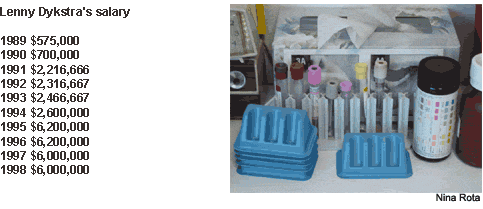A disgruntled ex-business partner, Lindsay Jones, has accused Lenny Dykstra of taking steroids while he was an outfielder for the New York Mets and Philadelphia Phillies. The bodybuilder who allegedly supplied Dykstra with the drugs, Jeff Scott, says in a sworn statement that Dykstra greatly increased his steroid use in spring training of the 1993 season. That season he hit 19 home runs. The most he had ever hit before 1993: 10 home runs. The most he hit after 1993: 5 home runs.
Oh, and he also led the league in hits, walks and runs and came in second to, you guessed it, Barry Bonds in the MVP voting.
Dykstra averaged 10 home runs over 162 games throughout his career and that includes 1993. So let’s say that steroids accounted for 9 home runs in 1993. Not a lot by today’s standards but almost double Dykstra’s previous maximum output.
As you can see by looking at these figures, more home runs means more money.
He received a four year contract extension in 1994 worth, according to these figures, $24.4 million. I don’t believe that inflation was on a rampage during that period so we can safely assume that his marvelous 1993 season accounted for the jump in salary – a salary that was the highest ever for a leadoff hitter at that time.
True, his salary tripled after the 1990 season but he had 192 hits in 1990, only two less than in 1993 with 47 less at bats. The major difference between 1990 and 1993 is the number of extra base hits.
Information abhors a vacuum. If we don’t have it, we’ll make it up. That means that baseball might well ending up looking worse than if certain players had never taken any steroids at all.
Dykstra was a tough, productive baseball player. No doubt his salary would have gone up without the 19 home runs but it’s doubtful that it would have doubled. He barely played half a season in 1991 and 1992 and only made it through the second year of his new contract before retiring.
As more and more information about steroid use finally makes it’s way into the light, I find myself calculating it’s influence on baseball through inference. Since baseball purposely turned a blind eye, we’ll never really know for sure. That’s unfortunate because many players who would have had fine careers without taking steroids now find themselves subject to a lot of speculation. Hall of Fame careers are in danger.
Information abhors a vacuum. If we don’t have it, we’ll make it up. That means that baseball might well ending up looking worse than if certain players had never taken any steroids at all.
This is the classic failure of a deal with the devil. The hopeful supplicant takes a magic potion to lift their skills above their fellow players and ends up tainting accomplishments that did not need the benefits of steroids.
Would you rather let your career speak for itself or leave it in the hands of people like me?
